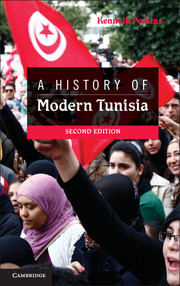Book contents
- Frontmatter
- Contents
- List of Maps
- List of Illustrations
- Acknowledgments
- A Political Who’s Who of Modern Tunisia
- Map of Tunisia
- Introduction to the Second Edition
- Introduction to the First Edition
- Chapter 1 The March to the Bardo, 1835–1881
- Chapter 2 Whose Tunisia? 1881–1912
- Chapter 3 Squaring Off, 1912–1940
- Chapter 4 Redefining the Relationship, 1940–1956
- Chapter 5 The Independent State Sets Its Course, 1956–1969
- Chapter 6 Regime Entrenchment and the Intensification of Opposition, 1969–1987
- Chapter 7 Constancy and Innovation in the “New” Tunisia, 1987–2003
- Chapter 8 A Revolution for Dignity, Freedom, and Justice
- Notes
- Suggestions for Further Reading
- Index
Chapter 5 - The Independent State Sets Its Course, 1956–1969
Published online by Cambridge University Press: 05 June 2014
- Frontmatter
- Contents
- List of Maps
- List of Illustrations
- Acknowledgments
- A Political Who’s Who of Modern Tunisia
- Map of Tunisia
- Introduction to the Second Edition
- Introduction to the First Edition
- Chapter 1 The March to the Bardo, 1835–1881
- Chapter 2 Whose Tunisia? 1881–1912
- Chapter 3 Squaring Off, 1912–1940
- Chapter 4 Redefining the Relationship, 1940–1956
- Chapter 5 The Independent State Sets Its Course, 1956–1969
- Chapter 6 Regime Entrenchment and the Intensification of Opposition, 1969–1987
- Chapter 7 Constancy and Innovation in the “New” Tunisia, 1987–2003
- Chapter 8 A Revolution for Dignity, Freedom, and Justice
- Notes
- Suggestions for Further Reading
- Index
Summary
State in the Service of the Party, Party in the Service of the President
The magnitude of the support for ben Yusuf appalled Bourguiba. Basking in the titles al-za ʿim (the leader) and al-mujahid al-akbar (the supreme combatant), he had persuaded himself that his combination of charisma and dedication to the nationalist struggle ensured him the gratitude and loyalty of all Tunisians. The rebellion that had, at its height in late 1955, threatened to plunge the country into civil war still cast a pall over the celebrations marking the end of the protectorate in March 1956. It provided Bourguiba with a sobering reminder that the Tunisian public knew that others, whose thinking differed from his, had also played important roles in the acquisition of independence. The presidency of the Neo-Dustur did not translate into the unswerving allegiance of the masses, particularly if the party suffered from internal fragmentation.
Bourguiba had masterfully employed the rhetoric of nationalism to mobilize hundreds of thousands of ordinary Tunisians behind the readily comprehensible demand to end French rule, but with independence fiery anticolonial speeches lost most of their currency. To move from that achievement to the construction of a viable, prosperous, and modern state required convincing those same Tunisians of the merits of social and economic ideas that had taken a back seat during the campaign against the protectorate regime – ideas whose value they did not always find inherently obvious and that rarely enjoyed the breadth of support national liberation had. Ensuring their widespread acceptance required a lengthy process of education. As that went forward, Bourguiba prepared to advance his postindependence agenda and to guard against future challenges by securing a role in the new government and strengthening his position within the Neo-Dustur. With a self-confidence that frequently slipped into arrogance, Bourguiba cast himself in the roles of patriarch, teacher, and disciplinarian, making it clear that he, the founding father of modern Tunisia, knew better than anyone else what its people, his children, required.
- Type
- Chapter
- Information
- A History of Modern Tunisia , pp. 135 - 159Publisher: Cambridge University PressPrint publication year: 2014



